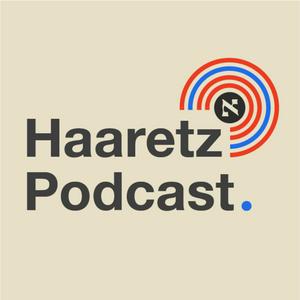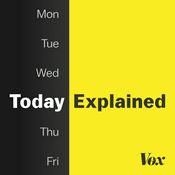168 episodios
'Israel has committed genocide in Gaza': California Democrat Scott Wiener on his controversial U-turn
20/1/2026 | 35 minCalifornia State Senator Scott Wiener, the frontrunner for former House Speaker Nancy Pelosi’s congressional seat, insisted on the Haaretz Podcast that his change of heart regarding whether Israel’s actions in Gaza constitute a genocide did not represent a political flip-flop.
In early January, Wiener faced an angry audience at a candidate’s forum, in which he debated his two rivals in the California Democratic primary to replace retiring Representative Pelosi. In a lightning round question, Wiener was asked to answer “yes” or “no” to the question of whether Israel was "committing genocide in Gaza." His rivals answered “yes” while Wiener refused to respond, prompting boos and jeers. Shortly afterwards, he released a video in which he clarified that he did believe Israel’s actions in Gaza should be defined as genocide.
On the podcast, Wiener said that in the past, “I've used very, very stark language that, frankly, has not been particularly different from genocide. I chose not to use the word genocide for a variety of reasons, because, it has been weaponized against Israel and against Jews over time.”
Wiener also responded to the harsh backlash from the Jewish community following the release of the video. Wiener, the co-chair of the California Legislative Jewish Caucus, said he “respects and honors” why the Jewish community feels “hurt and betrayed” by his word choice. “I also believe that we have a responsibility to call this what I believe it is,” he said.
He pointed to the Quinnipiac poll published in August in which half of Americans defined Israel’s actions as a genocide and noted that it will likely be officially declared as such by the International Court of Justice. “The institutional Jewish community in this country has not grappled with that reality.”
Read more:
Jewish California Congressional Hopeful Says Israel Committed Genocide in Gaza, After Earlier Refusal to Do So
Half of Registered U.S. Voters Say Israel Committing Genocide in Gaza, Poll Finds
California Governor Gavin Newsom Says Israel's War in Gaza Was Not Genocide, but 'Destruction Broke My Heart'
Analysis | Is It Important to Call Israel's Carnage in Gaza 'Genocide'?
Israel Is Committing Genocide in Gaza, Genocide Scholars' Association Says
See omnystudio.com/listener for privacy information.'Birthright is tone-deaf': Why many young Jews don’t want their free trip to Israel
16/1/2026 | 27 minBirthright Israel is celebrating 25 years of offering a free 10-day trip to Israel to every young Diaspora Jew with the hope of fighting assimilation. The celebrations include a $900 million fundraising campaign.
But, as Haaretz Jewish World editor Judy Maltz told the Haaretz Podcast, their traditional mission and "fun in the sun" marketing campaign have become deeply problematic, given the battering of the image of the Jewish state in the eyes of many young people around the world.
Instead of unaffiliated Jews, Maltz said, the programs are increasingly filled with participants who are "presumably already very much in touch with their Jewish identity," begging the question as to whether this is where hundreds of millions in Jewish philanthropic dollars and funding by the state of Israel should be going.
On the podcast, Maltz discusses the reasons behind the shift, based on more than 30 interviews with Birthright participants, and those who chose not to go.
Many of those interviewees, she reports "feel very distant from Israel. They feel very uncomfortable with its actions, especially over the past two years with what's happened in Gaza."
Maltz also discusses a new and different trend she has reported on: trips to Israel by young leftist Jews who choose to spend their time off providing "protective presence" in West Bank Palestinian villages menaced by violent settlers. "Being on the ground is really the only way to bear witness," she was told by the young Americans camping out in the villages.
Read more:
Has Birthright Become a Toxic Brand?
Not Masada or the Dead Sea: Young Diaspora Jews Provide Protective Presence in the West Bank
Birthright Is Resuming Its Free Trips to Israel for the First Time Since October 7
Haaretz Editorial: Birthright Israel: The Problem Is Reality, Not Money
See omnystudio.com/listener for privacy information.- Prime Minister Benjamin Netanyahu dropped a bombshell in a recent interview when he declared he had told U.S. President Donald Trump that Israel no longer needed a long-term commitment from the U.S. for military aid, and that he planned to “taper off” the $3.8 billion Israel now receives to “zero” within ten years.
On the Haaretz Podcast, Washington correspondent Ben Samuels and senior defense analyst Amos Harel discuss the implications of Netanyahu’s announcement and the circumstances behind it.
Both say it is clear that Trump had signaled that aid would be significantly reduced, and that Netanyahu’s announcement was intended to avoid the appearance that the cuts were being forced on Israel.
“Netanyahu did not have much choice. I think this is something that Trump expected him to do,” Harel said. “It was bound to happen, and it was better for Netanyahu to appear as if he's the one who initiated it.”
Samuels noted that both Republicans and Democrats – for different reasons – were questioning the level of aid Israel receives, despite the fact that the majority of the billions in assistance are spent on weapons purchased from U.S. manufacturers.
Looking ahead, Samuels discussed potential “cognitive dissonance” for pro-Israel lobbying organizations like the American Israel Public Affairs Committee as they grapple with a future in which substantial military aid will no longer be part of the equation of when it comes to U.S. support for the Jewish state.
“Supporters of AIPAC have treated military aid as this sacrosanct thing - saying that if you dare question it, then you are not only in support of endangering Israeli lives, but it makes you borderline antisemitic,” Samuels said. “How are they now going to just turn around and flip the script and say: ‘You know what? You're right. We don't need U.S. military assistance to Israel.’”
Read more:
Top GOP Senator Urges Halt to U.S. Military Aid After Netanyahu Says Israel Aims to End Reliance Within Decade
On Ending U.S. Military Aid to Israel, Netanyahu Is Trying to Spin His Failure as Success
Today Marks the End of an Era for pro-Israel Democrats – and for AIPAC
It Didn't End Well for Sparta, and It Won't for Israel Either
See omnystudio.com/listener for privacy information. How will the Iran protests end? Arash Azizi says 'This won't be a classic revolution'
08/1/2026 | 26 minOnce again, Iranians have taken to the streets. Starting in late December, the plummeting value of the national currency, along with the soaring cost of living, were the catalyst for a fresh wave of protest – and one that soon turned political.
Although the government has been quick to crack down on the demonstrations, the regime has been dealt some heavy blows in the past year, and analysts are pondering whether this could be the movement that ends the ayatollahs’ reign for good.
Haaretz reporter Linda Dayan was joined by Arash Azizi, lecturer at Yale University and author of "What Iranians Want: Women, Life, Freedom" and "The Shadow Commander: Soleimani, the U.S., and Iran's Global Ambitions” to talk about these protests, and what they mean for Iran, for Israel, for the region and for the world.
“In some of the previous protests, there was always a mix of hope and anger,” explains Azizi. “This time, there’s a lot more anger, because people know that they want an end to this regime, but they can’t find an easy path… there’s a lot more despondency and desperation.”
Azizi explains that one of the key obstacles in realizing this aspiration is Iran’s fractured would-be opposition, including the ousted Shah’s son Reza Pahlavi, who’s found support from some Israeli lawmakers. The protesters “don’t have a disciplined political leadership that you need to bring about that kind of change,” Azizi says. Iran’s developments will likely “have the color of a coup, perhaps even more than a revolution” – and be led by figures currently inside the regime.
U.S. President Donald Trump has also warned the Iranian regime against violently repressing the protests. The ouster of Nicolas Maduro in Venezuela – a key Iranian ally – by U.S. forces “was a reminder to the Iranians that Trump is not bluffing, and that he could take action against them,” notes Azizi.
“The idea that Trump would assassinate Khamenei, let’s say, with the help of Israel would have been unthinkable a few years ago… now, it’s really a possibility.”
Read more:
At Least 35 Killed, 1,200 Detained in Iran Protests as Threat of U.S. Intervention Looms
Analysis by Zvi Bar'el | Why Trump's Venezuela Playbook Won't Work in Iran
Israeli Officials Warn Iran May Strike Across the Middle East to Quell Protests
Analysis by Ben Samuels | What Trump's Attack on Venezuela Means for Iran and MAGA Isolationists
The Israeli Influence Operation Aiming to Install Reza Pahlavi as Shah of Iran
See omnystudio.com/listener for privacy information.- It was a challenging year to be a Diaspora Jew.
The war in Gaza and growing hostility to Israel had an undeniable impact on Jewish life across the world in 2025. Events in Israel became a focus in local and national politics around the world – and served as a catalyst in a global surge in antisemitism. The year was punctuated by horrific and deadly attacks against Jews from Washington D.C. to Manchester to Australia’s Bondi Beach.
On this special episode of the Haaretz Podcast, we revisit episodes from the past year featuring the voices of Diaspora Jews, along with Haaretz journalists covering the Jewish world.
The conversations include Brooklyn Rabbi Rachel Timoner on the impact of Zohran Mamdani’s candidacy for New York City mayor, Rabbi Delphine Horvilleur on the complexity of advocating for the hostages and a cease-fire agreement. Also on the podcast: American Jewish Committee CEO Ted Deutsch following the terror attack at his organization’s event, and Lynda Ben Menashe, a Jewish leader in Sydney Australia after the Bondi Beach massacre, and many more. Among the featured Haaretz journalists: English edition editor-in-chief Esther Solomon, Washington D.C. correspondent Ben Samuels and Jewish world correspondent Judy Maltz.
Read more:
How Antisemitism Haunts Jewish Communities Around the World
Fire, Fear and Freedom: Israel in 2025, Through the Eyes of Haaretz Photographers
From Mamdani to Bondi, Trump to War Crimes: Top Haaretz Opinions of 2025
See omnystudio.com/listener for privacy information.
Más podcasts de Noticias
Podcasts a la moda de Noticias
Acerca de Haaretz Podcast
From Haaretz – Israel's oldest daily newspaper – a weekly podcast in English on Israel, the Middle East and the Jewish World, hosted by Allison Kaplan Sommer.
Sitio web del podcastEscucha Haaretz Podcast, Hoy en EL PAÍS y muchos más podcasts de todo el mundo con la aplicación de radio.es

Descarga la app gratuita: radio.es
- Añadir radios y podcasts a favoritos
- Transmisión por Wi-Fi y Bluetooth
- Carplay & Android Auto compatible
- Muchas otras funciones de la app
Descarga la app gratuita: radio.es
- Añadir radios y podcasts a favoritos
- Transmisión por Wi-Fi y Bluetooth
- Carplay & Android Auto compatible
- Muchas otras funciones de la app


Haaretz Podcast
Escanea el código,
Descarga la app,
Escucha.
Descarga la app,
Escucha.









































